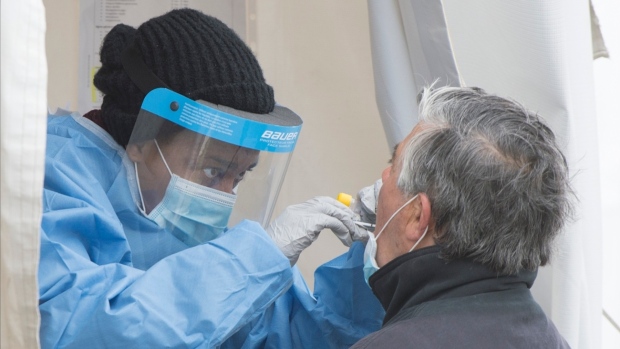Nearly half of all Canadians believe at least one COVID-19 myth, study finds

OTTAWA — A new study suggests Canadians are not immune from misinformation surrounding the COVID-19 pandemic.
A recent survey by the School of Journalism and Communication at Carleton University in Ottawa found 46 per cent of respondents believed at least one of four widespread myths about the deadly virus.
The most commonly-believed myth was the widely discredited conspiracy theory that the coronavirus that causes COVID-19 was engineered as a bioweapon in a Chinese lab and released into the general population.
The study found 26 per cent of respondents believed the debunked theory that the virus was engineered in a laboratory.
Just over one-fifth of respondents (23 per cent) believed the drug hydroxycholoroquine, widely touted by U.S. President Donald Trump as a deterrent and/or treatment, was effective, despite studies showing no benefit to COVID-19 patients.
Health Canada has issued a warning about the use of hydroxychloroquine outside of a supervised setting as prescribed by a physician.
One-sixth of respondents (17 per cent) believed the myth that regularly rinsing one’s nose with a saline solution can protect oneself from COVID-19. Just over one-tenth of respondents (11 per cent) believed the conspiracy theory that COVID-19 is not a serious illness but rather a cover-up for illnesses believed to be caused by 5G wireless technology, despite the scientific consensus that 5G is not harmful to human health.
The conspiracy theory about 5G is linked to dozens of arson attacks against cellular towers in Europe. Quebec police are also investigating at least four cellular tower fires near Montreal.
The study also found young adults, aged 18-29, were slightly more likely than other cohorts to believe the conspiracy theories and myths asked about in the survey.
Misinformation not easy to spot, despite belief otherwise
Sarah Everts, CTV Chair in Digital Science Journalism, and a co-researcher on the study, tells CTV News at Noon, one of the most remarkable things the study found was how many people believed they could easily spot misinformation online, despite believing it themselves.
“I expected there to be some buy-in to the conspiracy theories, I just didn’t expect there to be such high percentages of people who believed the conspiracy theories,” Everts said.
More than half of all respondents, 57 per cent, said they could “easily distinguish conspiracy theories and misinformation from factual information about COVID- 19.” About half of all respondents who said they believed the bioweapon conspiracy theory said they could easily tell misinformation from facts, while 58 per cent of those who believed the 5G conspiracy theory thought they could easily tell fact from fiction.
“If you think it’s easy to spot conspiracy theories online, you’re maybe not doing due diligence,” Everts told CTV’s Patricia Boal. “You’re more likely to believe a conspiracy theory when it confirms something you already believe. When you’re scrolling through and you see a statement that claims something and you want fistpump and say ‘I told you so,’ that’s when you need to pause. Read the article, look at the source, and see if it’s reputable. The Trust Project is something to look for. Always ask yourself, ‘How do they know that? How do I know that?’ Is the article divulging its sources, being transparent, and speaking to established experts, or are they promoting things that are clearly opinion?”
Everts says everyone has fallen prey to misinformation at one time or another.
The study also found that respondents who believed in pseudoscience and conspiracy theories spent more time on social media than other respondents did. Everts says this may explain the correlation between the increased numbers in younger adults versus older adults.
Survey methodology
The public opinion survey is a project of the School of Journalism and Communication at Carleton University funded by its Faculty of Public Affairs and supported by Abacus Data. A second phase of the survey will be conducted in early June, with a comprehensive report to follow.
The first phase of the survey was conducted with 2,000 Canadian residents from May 5 to 8, 2020. The margin of error for a comparable probability-based random sample of the same size is +/- 2.19 per cent, 19 times out of 20.
The data were weighted according to census data to ensure that the sample matched Canada’s population according to age, gender, educational attainment and region. Totals may not add up to 100 due to rounding.


